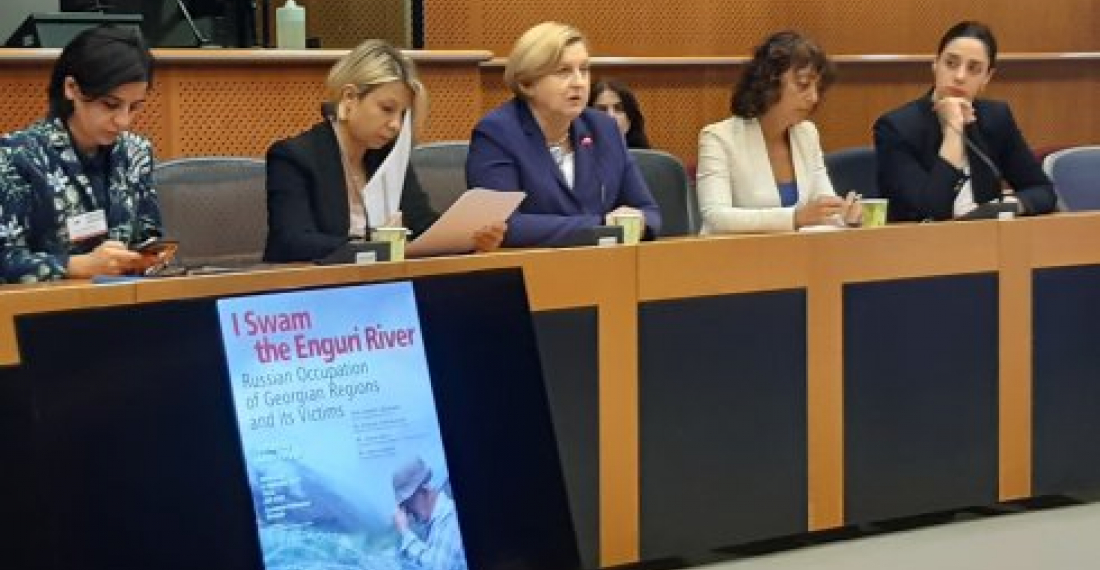The humanitarian situation resulting from the conflicts in the Georgian regions of Abkhazia and South Ossetia, and ongoing concerns about the human rights situation in the two territories, was the focus of a meeting held at the European Parliament on Wednesday (4 September), attended by MEPs, parliamentary staff and representatives of the think-tank and NGO community.
The meeting was hosted by Polish MEP Anna Fotyga from the European Conservatives and Reformists Group.
Speakers in the well attended meeting included the Head of the Georgian Mission to the EU, Natalie Sabanadze, the Ombudsman of Georgia Nino Lomjaria, and producer of the new film "I swam across the Inguri River", Anuna Bukia.
Opening the proceedings, Anna Fotyga MEP said that the situation in Georgia and in Russian occupied regions of Georgia were a matter of continued interest for the European Union and the European Parliament. She highlighted the situation near the Line of Contact in the Abkhazia and South Ossetia conflict zones and said that serious incidents continue to happen. She hailed the efforts of the European Union and the European Union Monitoring Mission in Georgia in support of Georgia's independence and in closely observing and monitoring the situation.
Addressing the issue of the unresolved conflicts in Georgia, Ambassador Nathalie Sabanadze, the Head of the Georgian Mission to the European Union, said that war against Georgia's independence and sovereignity had been ongoing since the 1990s and this war has never stoped despite many cease fires. Real problems continue to emerge on the line of contact. Russia has adopted a policy of protracting the conflicts as a means to normalising the injustices that it had created. Unfortunately the international community is not always focused enough on the matter, since the international agenda was busy and crowded, and issues compete for the attention of world capitals. Russia has used this situation to rise the stakes, every time committing an even more outrageous action than before, leaving the international community struggling to respond. Ambassador Sabanadze said that it is impossible to speak about the conflicts in Georgia as local conflicts since the stakes were quite high, and what happened and is happening in Georgia has consequences way beyond.
The Ombudsman of Georgia, Nino Lomjaria said that whilst the war may have ended, the consequences could still be felt by the half a million people displaced by it, and the consequence of occupation continues. Russian borderisation policy was dividing villages, communities and families. Between 2014-18 1700 persons were prosecuted by the separatist authorities for so called border infringements. Ms Lomjaria said that the human rights situation in Abkhazia and South Ossetia was deteriorating year by year. This was particularly the case with regards to people of Georgian ehtnicity living in areas controlled by Sukhumi and Tskhinvali.
During the event the audience was introduced to the film documentary "I swam across the Inguri River" by its creator Anna Bukia. Bukia said that she herself had crossed the Inguri River when she was four years old to live the life of a displaced person. She said that she had done the film as a sense of protest at the injustice that had been committed, and because it helped her answer the question of who she was as a person. Participants in the event viewed short snippets from the documentary depicting moments of the conflict, and in more recent times, efforts of people to cross the boundary line that seperates them from their families.
There were short comments from the floor. Dennis Sammut, Director of the LINKS said that the conflicts in Georgia were multi layered and multi dimensional. One could approach them from many different perspectives. He said that one asspect that had always worried him was the situation of the Georgian population in the Gali region. Here a population of thousands was subjected to outright discrimination based on their etnicity. This situation was not being given proper attention in Europe and he appealed to the new members of the European Parliament to spend time on this issue. Andrius Kubilius MEP (Lithuania - EPP) said the European Union needed to have a more clear strategy on how to deal with the Georgian conflicts and particularly the human rights situation in Abkhazia and South Ossetia.
Responding to the comments from the floor Ombusman Nino Lomjaria said that the negotiation process on the conflict was deadlocked, and in any case there was no space in those negotiations to discuss the human rights situation. She called for human rights to be put at the centre of the agenda and for the creation of a framework for a comprehensive human rights discussion which was depoliticised and regardless of ethnicity.
Various speakers highlighted the lack of access by the international community to Abkhazia and South Ossetia and various suggestions were mentioned as to how this situation could be mitigated. There were also 500 cases brought in front of the European Court of Human Rights connected with violations in Abkhazia and South Ossetia, and participants felt that more use could be made of the judicial track to increase awareness of the issues.
source: commonspace.eu
photo: Speakers at the event "I crossed the Inguri River" held at the European Parliament on 4 September 2019 ((c) LINKS Europe)






